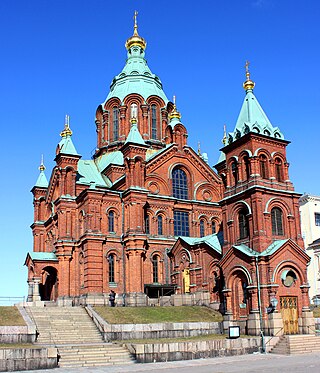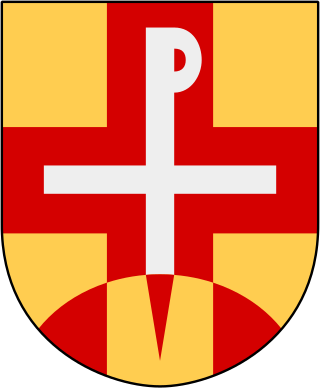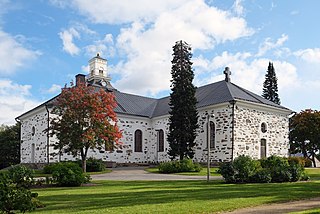
The Evangelical Lutheran Church of Finland is a national church of Finland. It is part of the Lutheran branch of Christianity. The church has a legal position as a national church in the country, along with the Orthodox Church of Finland.

The Orthodox Church of Finland or Finnish Orthodox Church is an autonomous Eastern Orthodox archdiocese of the Ecumenical Patriarchate of Constantinople. The church has a legal position as a national church in the country, along with the Evangelical Lutheran Church of Finland.
The International Lutheran Council (ILC) is a worldwide association of confessional Lutheran denominations. Member bodies of the ILC hold "an unconditional commitment to the Holy Scriptures as the inspired and infallible Word of God and to the Lutheran Confessions contained in the Book of Concord as the true and faithful exposition of the Word of God." The member church bodies are not required to be in church-fellowship with one another, though many of them are.

The Mission Province is a Swedish independent ecclesiastical province founded by members of the Church of Sweden who are opposed to the ordination of women to the priesthood and episcopate. The province, which aligns with Confessional Lutheranism, considers itself as a free-standing diocese within the Church of Sweden, a position rejected by the church itself. The Mission Province was founded on 6 September 2003 and shares altar and pulpit fellowship with those in the Communion of Nordic Lutheran Dioceses, in addition to being a member of the International Lutheran Conference.
The Archdiocese of Turku, historically known as Archdiocese of Åbo, is the seat of the Archbishop of Turku. It is a part of the Evangelical Lutheran Church of Finland, and its see city is Turku.

The Diocese of Namibia is part of the Anglican Church of Southern Africa, which is itself part of the Anglican Communion. The diocese, which covers the whole country of Namibia, was originally known as the Diocese of Damaraland. Most of the Anglicans in Namibia live in Ovamboland in the north of the country and speak the Oshikwanyama language.

The Monastic Community of Enonkoski is the only Evangelical Lutheran "monastery" in Finland. It is located in the village of Ihamaniemi in the Enonkoski municipality. The monastery building previously served as elementary school. The monastery was founded in 1994. There are currently no permanent residents in the monastery.

Finland is a predominantly Christian nation where 65.2% of the Finnish population of 5.6 million are members of the Evangelical Lutheran Church of Finland (Protestant), 32.0% are unaffiliated, 1.1% are Orthodox Christians, 0.9% are other Christians and 0.8% follow other religions like Islam, Hinduism, Buddhism, Judaism, folk religion etc. These statistics do not include, for example, asylum seekers who have not been granted a permanent residence permit.

Kuopio Cathedral is a stone Neoclassical-style Evangelical Lutheran church in Kuopio, Finland, and the seat of the Diocese of Kuopio. The cathedral was built between 1806 and 1815.

The Evangelical Lutheran Church in Namibia (ELCIN) is a Lutheran denomination based in Namibia. It has a total membership of over 772,398, mainly in Northern Namibia. Formerly known as the Evangelical Lutheran Ovambo-Kavango Church (ELOC), it played a significant role in opposition to Apartheid in Namibia and was part of the Namibian independence struggle.

The Diocese of Oulu is a diocese within the Evangelical Lutheran Church of Finland. The diocese was first founded in the town of Kuopio in 1851, but the episcopal see was moved to Oulu in 1900.

The Diocese of Lapua is one of nine dioceses within the Evangelical Lutheran Church of Finland. The diocese was founded in 1956.
The Anglican Chaplaincy of St Nicholas, Helsinki was established by those who fled from Saint Petersburg during the Russian Revolution. They settled first in Vyborg from where they were forced to flee again during the Winter War and stayed in Helsinki, Finland. The Chaplaincy is part of the Church of England's Diocese of Gibraltar in Europe and works closely with the Evangelical Lutheran Church of Finland under the Porvoo Agreement. Since there are now three independent Anglican congregation in Finland, the Chaplaincy has moved from using the name Anglican Church in Finland and is using its official name under the Church of England.
The Mission Diocese, officially the Evangelical Lutheran Mission Diocese of Finland, is an independent confessional Lutheran "ecclesial structure" in Finland. The Mission Diocese considers itself to be "part of ‘the one, holy, catholic and apostolic church’" to be "truly a church" and to act "fully independently as a church", although it has not applied for state-recognition as a registered religious community. The Mission Diocese has its origins in the conservative movements of the Evangelical Lutheran Church of Finland (ELCF) and it self-identifies as existing in the same continuum of Lutheran faith and congregational life of the ELCF whose spiritual heritage it cherishes, yet not being part of its administrative structures.
Shekutaamba Väinö yaVäinö Nambala Shekutaamba Väinö Väinö Nambala, popularly known as S V V Nambala, was born from a peasant family at Onewawa village, Omuntele constituency, in Ondonga kingdom in the Oshikoto Region today, on the 5 th August 1952. He is the second last born of 19 siblings. His education career started at the age of ten in 1962. He attended school at Ondjamba Primary School ; Omuntele Primary and High Primary School ; Onayena Boys School (1969); Ongwediva High School and Oshigambo High School.
The Communion of Nordic Lutheran Dioceses are Lutheran dioceses that entered into schism with their Scandinavian national churches in 2003 due to what they perceived as "the secularization of the national/state churches in their respective countries involving matters of both Christian doctrine and ethics". These dioceses are members of the International Lutheran Council, a body of Confessional Lutherans, they are in full communion with one another and include the Evangelical Lutheran Mission Diocese of Finland, Mission Province of the Church of Sweden, and the Evangelical Lutheran Diocese of Norway. These dioceses entered into schism with the Evangelical Lutheran Church of Finland, Church of Sweden, and Church of Norway, respectively, though the Mission Province considers itself to be a non-territorial diocese within the Church of Sweden. Their lines of apostolic succession derive from other traditional Lutheran Churches, such as the Evangelical Lutheran Church in Kenya; Walter Obare Omwanza, presiding bishop of the Evangelical Lutheran Church in Kenya, assisted by bishops Leonid Zviki from Belarus, David Tswaedi from South Africa, Børre Knudsen and Ulf Asp from Norway, consecrated Arne Olsson in apostolic succession as the Ordinary for the Mission Province. The first bishop of the Evangelical Lutheran Mission Diocese of Finland, Risto Soramies, was then ordained by Matti Väisänen of the Mission Province of the Church of Sweden. These dioceses have an Evangelical Catholic churchmanship, reflective of the influence of High Church Lutheranism and Pietist Lutheranism in Scandinavia. As such, the Communion of Nordic Lutheran Dioceses affirms:
We believe, teach and confess that biblical faith and doctrine which is founded on the prophetic and apostolic Scriptures of the New and the Old Testament and which has been expressed in the three main creeds of the Early Church, that is, the Apostolic, the Nicene-Constantinopolitan and the Athanasian Creed, and in the unaltered Augsburg Confession, and that is rightly and bindingly explained by all the books accepted into the Book of Concord of the Lutheran Church.
This page is based on this
Wikipedia article Text is available under the
CC BY-SA 4.0 license; additional terms may apply.
Images, videos and audio are available under their respective licenses.












